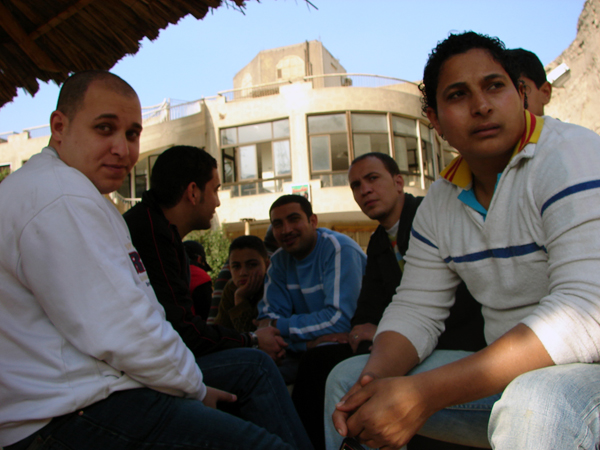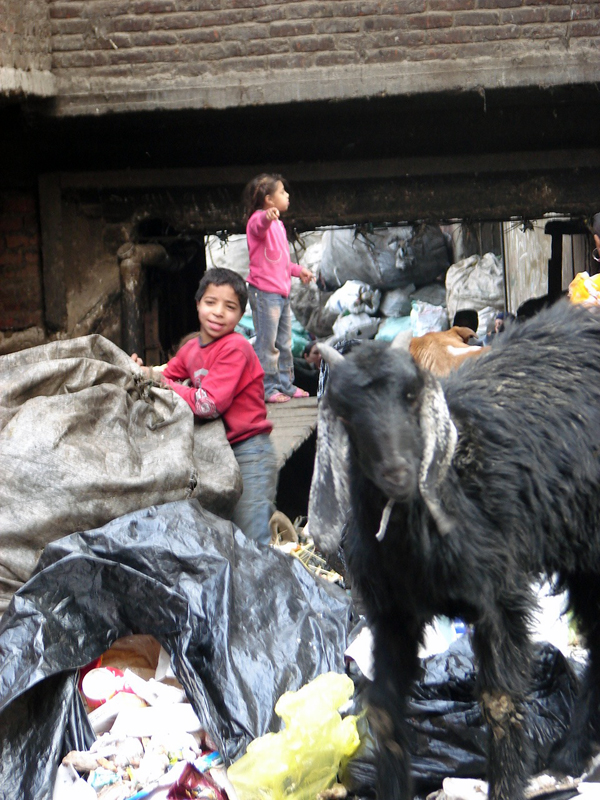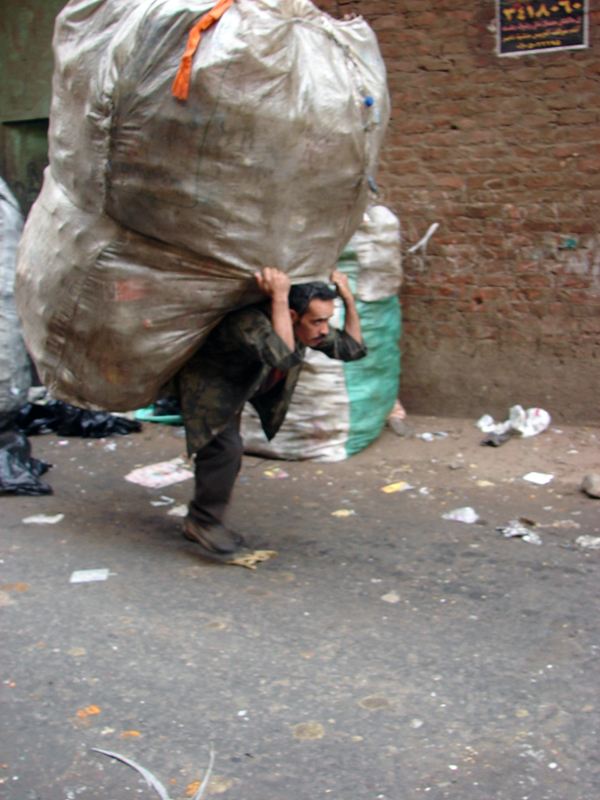All around the world people are talking about how Tahrir Square is what could have happened in 1989; how People Power finally rose up against the tyranny of the world; how they felt tears in their eyes and prickles on their skin watching and listening as the poor of Egypt took over the capital and then finally the entire country.
The revolution in Egypt is a powerful reminder that Yes We Can when we really want to: when bread prices rise up out of our reach, when jobs never materialize, when normal people oppress and cheat their fellow men and women just because they have a uniform on, when our leaders drone on about Change only to do exactly as they have always done.
All these things contributed to the fall of Mubarak. But the most vital forces weren’t the 30 years of corruption or the static state of Egypt’s economy: the two factors that contributed the most to Egypt’s revolution were the rise of China’s middle class and America’s misguided Middle East Policy.
America is the Symbol, Egypt the Example

The people of Egypt managed this while Americans and their government stood by and watched. In fact, the government they overthrew was — until a couple weeks ago — the US government’s ally in the struggle to subjugate the Middle East and exploit as much of the region’s riches for as long as possible. Also known as The War on Terror.
A few days ago, the New York Times highlighted a group of educated young Egyptians, including a Google executive, who reportedly planned the protests from day one. The group of intellectuals allied with the Muslim Brotherhood and erstwhile Communists, cleverly using the poverty of the masses to swell their ranks and ultimately outsmart the government while keeping each other abreast of their activities using social media and Google Chat. It was a self-congratulatory piece as much as it was a report on the Egyptian Uprising.
Articles like these are in keeping with America’s need to feel a part of every democratic revolution no matter what the color. While Obama distances himself from George W. Bush’s “old friend” and 30-year beneficiary of USAID Hosni Mubarak, Americans at large love to hear that Facebook isn’t just a platform for daily updates, but also a potent tool for Egypt’s revolutionary-minded.
The truth is, we are essentially “wallflowers at the revolution,” even though we really want in.
If it weren’t for the American government’s (or perhaps better put American Big Business’s) deep disregard for how they get their profits, then the people of Egypt would have never had the boogieman they needed in order to unite — peasant with clerk, student with cleric, engineer with cabbie — and rise up. It’s the same cast of characters that everyone is tired of listing: the military-industrial complex that thrives off of conflict, the massive construction companies that require destruction, the big energy companies that need stability, the Wall Street speculators who love scarcity, inequality and imbalance — the difference is that in Egypt the revolution actually succeeded.
And for many Americans out there — including the President I voted for — the fact that a little band of young intellectuals may have used Twitter and Facebook a few times and are able to write in English is enough to exonerate us for our ignorance and indifference.
Good Times Cannot Be Had By All

On the far side of the spectrum is China, a country and people who want little to do with the uprisings in the Middle East. China doesn’t have the same conditions as Egypt, but the CCP is not taking any chances: discussion is muted and the coverage that does leak through is of a Shanghai tour group’s harrowing escape from Cairo and other scary, violent effects of People Power.
Last year was a great year for wheat, but not great enough to satisfy the world’s demand for wheat. Although the world’s wheat producers put together one of the largest harvests ever, droughts and severe winters in Russia and China coupled with increased consumption (especially in Asia) outstripped production.
These events drove the price of wheat up higher than ever before and as David Goldmann writes in the Asia Times,
“In this case, Asian demand has priced food staples out of the Arab budget. As prosperous Asians consume more protein, global demand for grain increases sharply (seven pounds of grain produce one pound of beef). Asians are rich enough, moreover, to pay a much higher price for food whenever prices spike due to temporary supply disruptions, as at the moment.”
In a follow up to to the article linked above, Goldmann puts the West’s ruminations on which model will replace Mubarak’s grip on power in Egypt into perspective:
“Egypt has no oil, insignificant industry, small amounts of natural gas, and 40 million people who are about to become very, very hungry. Without figuring out how to feed the destitute bottom half of the Egyptian population, all the talk of “models” is window-shopping.”
So it’s not just that wheat crops were insufficient (in fact this years wheat harvest is the third largest recorded), but the price of wheat is too high for the poorest people of the world to afford. Al Jazeera has followed the protests across the Middle East since the first Tunisian set himself on fire and they too are noticing that the trend here is not democracy, but hunger.
Population and demand is rising, supply is unable to satisfy everyone and under our free market money-based socio-economic model, the poorest of the world are “priced out” of the game and must endure with less. The first governments to topple are those like Egypt, who are little more than corrupt client states dependent on aid and tourism for survival.
Egypt’s Downtrodden Masses

I only spent a few weeks in Cairo back in 2006. While I was there I spent much of my time in Mukattam, an extraordinary city of garbage inhabited by the Coptic Christians of the city — migrants from the south who make their living collecting, sifting and selling the refuse of the nation’s capital. They’re relegated to the very bottom rung of society mostly because they’re Christian, but also because they eat pork.
The people of Mukattam were a hardy, optimistic bunch and they thought that education would bring them out of the sewers and into mainstream society. They spent all of their money on their children’s schooling (unless the patriarch decided that sifting through garbage could bring more money, which they often did) in the hopes of a new life.
Those hopes ran up against two walls: the fact that few employers outside of Egypt recognize Egyptian diplomas and that tourism is the largest money-maker in the country. Just like with Tunisia and other parts of the Middle East, an education is no guarantee of a job.
I also spent some time checking out schools built specifically to educate small girls, located deep in the countryside, where the sun beat down upon brown villages filled with idle men and scurrying women. The girls in these schools were so eager to learn and so excited by each and every letter they wrote that it was heartbreaking to learn that around half of them would undergo female genital mutilation at the hands of their fathers and grandfathers.
Remember when almost every city in China had what they called “Lanwei Lou” (???), buildings that were built up halfway and then abandoned. That sickness is widespread throughout Cairo. All across town, rebar poke through dusty Nile bricks like ribs on a skeleton.
On a cab ride from the affluent Mahdi neighborhood where I was staying with the wife of an oil executive, the cabbie and I got to chatting and he learned that I was living in China. He spent the last ten minutes of our ride talking about how the Chinese were doing it, making money and developing while in Egypt the dust piled up as fat tourists came and went.
I wrote about the Chinese “invasion” of the Nile in 2007 and how the Egyptians welcomed it as an energetic and optimistic alternative to the US support for “stability” at the expense of the nation’s downtrodden poor. Little did they know that China’s entrepreneurial energy would help bring down the stable government that had been America’s “stalwart ally” for more than three decades.
Keep Your Head Above the Water

Whoever does emerge out of Egypt’s chaos as the leaders — be it the alliance of leftists and Islamists allegedly led by a Google-ist or some combination of government and military that clings to power for the time being — they will have a lot to deal with: Egypt is already in debt, the people are paying three to four times what they normally would for staples, and tourism has ground to a halt.
When the emotions of revolution subside and the hard work of nation building begins, how many Egyptians will have the patience to carry on? When the country begins defaulting, starving and begging for aid, how many speculators will have the heart to lend a hand instead of purchasing a grain future?
We’re only going to see more of this as China’s middle class gobbles up the world’s resources, making it hard for anyone else to get a piece of the pie. The cold truth is we have finite resources. Our socio-economic model would work great if we had infinite resources and exploiting them resulted in zero pollution. But that’s not the case. We’re running out of oil and no matter how many pigs we slaughter, wheat we reap or eggs we gather there will not be enough in the decades to come.
What role will the US and China play then?
good article sascha
I wish more and more people understand that we can try to fix our social problems with small solutions but eventually we will hit the wall big time.(and I guess it IS taking place…) Like u said the fundamental problem lies with our profit driven society. When enough plp get that together we can…
BTW did Hakim talk to you about his new project? Open government, based on transparency? Really cool..should look it up if u’ve not done it..
Also did you watch the zeitgeist moving forward?
By far the best one I reckon.
This is good too : “who is Peter Joseph”
Can find it on documentarywire.com
peace brother
yeah i did watch that,. i agree that the free market is broken and needs imbalance and inequality to keep running … but shedding this system we live in is like shedding skin and we aren’t reptiles … it will take a lot of suffering and hunger and death before anyone outside of the fringe even begins to contemplate a “New System” and I did watch the Zetigeist 3 film — their new system seems scary to me:
— a global supply and distribution network run by supercomputers
— an interconnected web of circle cities built according to a cookie cutter plan for our “maximum enjoyment”
this global approach to our current systemic malaise will not work. I recommend reading the works of Wendell Berry:
http://www.amazon.com/Sex-Economy-Freedom-Community-Essays/dp/0679756515
Well I agree that they certainly don’t have all figured out. I would say the most relevant part in Z3 is the first one. Understanding that our conditioning is creating what we like to call human nature. When in fact it is not at all our “human nature”. We are not animals that rely on underlying “commands” that are pre-determined, that drive us. (except for food, shelter and love)
Education is the Key here ( see john gatto or ivan illich )
Granted this is a huge issue, it is going to take a lot of great mind to find a viable solution and a viable transition.
And I expect this solution will only come with trials and errors. One cannot expect 1 lone guy to solve this problem…building on each other’s idea is the way to go I reckon. But it takes a will. I am only saying that we need more plp like Peter Joseph or Jacques Fresco to step up and propose things that are out of the box.
But I also expect you are right about the plp. It wil take a lot more social and economical problems for the regular Joe, hamed or shao bou to be open to a different system…unfortunatly.
There is no easy solutions..it seems to me that we are too caught up in the system for the massive raise in consciousness that would solve this without too much death and violence.
I don’t know wendell Berry, will try to find his work on line.( mei you xin yong ka)
That was a long answer..sorry…
peace
yeah i agree with you there — the best part of Z3 was the DNA vs. Environment part that basically fused the two concepts together instead of the norm of putting them at loggerheads ie nature and nurture join hands and influence each other in order to define human nature.
you should be able to find berry online. you’ll love him dude
Outstanding post. I hear that Algeria is promising demonstrations every saturday until their leader steps down and other countries are taking similar action after witnessing Egypt’s victory. When will it end?
http://www.nytimes.com/2011/02/15/world/middleeast/15iran.html?ref=global-home
Great piece Sascha…this is by far a better analysis of the situation in Egypt and its relevance to the rest of the world than anything I have seen in the mainstream press.I particularly love lines like this:
“Articles like these are in keeping with America’s need to feel a part of every democratic revolution no matter what the color…”
Ouch! It hurts cause it’s true. America always finds a way to pat itself on the back with a feigned moral superiority.
well the US is ignoring or just plain ignorant of the realities on the ground. The ‘Google Exec” led revolutionaries who used Fb to gather were woefully insufficient until they got the poor masses to join them — typical revolution — and the poor masses … well … they are very very poor and undereducated and they do not use FB or Twitter and they do oppress the people around them whenever possible …
Thanks for the praise, but really there are others who are writing about this, most notably Spengler at Atimes, whom I link to as David Goldmann.
If the protesters maintain their strength and will, i predict chaos and hunger. but what will probably happen is co-opting/crackdowning and a return to the status quo until the next grain price spike.
Great read. The US of course is primarily concerned with a bolstering governments and politicians such as Hosni Mubarak that have friendly ties with Israel, the #1 recipient of US foreign aid (read :weapons).
I predict that China and the US will (and currently are) make strategic allies in the Middle East foreshadowing future geopolitical conflicts. What Washington really fears is the prospects of a China & Iran partnership…
It is inspiring to see direct action in the streets of North Africa, a reminder to fact that the slogan “el pueblo unido jámas será vencido” is pertinent across geographic boundaries. The people united will never be defeated! That is unless the government decides to mow them down…
Times in which the slogan “No War But Class War” regains relevance.
hey elias,
check out Justin Raimondo over at my old stomping grounds Antiwar.com:
http://original.antiwar.com/justin/2011/02/20/nationalism-democracy-and-the-arab-awakening/
he breaks down the US role out there pretty well:
It seems like Libya is the new Egypt, as everyone’s focus has shifted to another African country on the verge of a successful revolution. Are the conditions very different in Libya you think, or will it go down just like in Egypt?
Interesting I stumbled on to this, but this post is woefully naive. Not that mentioning the peace for Israel is a cornerstone for American foreign policy or that China does not care in any way shape or form for any country outside of NK and Burma. Remember as hypocritical as American foreign policy is, at least we in the West try to do good in the world. Let me put it this way, you will never ever see Chinese people in mass donating to the West if some major horrific disaster ever occurred, while in the West does so all the time.
hey D, you mistake foreign policy for individual empathy. No govt cares in any way shape or form about any other country unless there is a profit — excellent example being US ally Egypt, dropped like a hot potato when the poop hit the fan.
People, on the other hand, are capable of caring a lot for each other and that’s what I see in the West more than in China too.